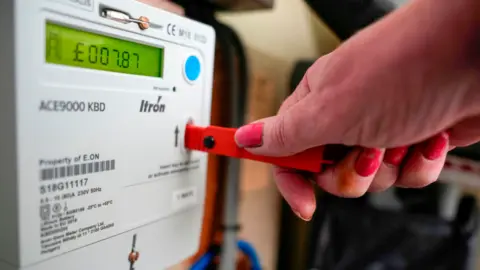New mothers faced energy meter force-fittings
 Getty Images
Getty ImagesThe first batch of new warrants granted to allow the forcible fitting of prepayment meters wrongly included the homes of young mothers.
An investigation by The Times newspaper found two of the test cases involved mothers of children under two. One of them gave birth in September.
Ofgem rules state that households with children under two should not be forcibly fitted with the meters.
Scottish Power said it cancelled the warrants when it received the details.
"As we made clear in court, the warrants granted are for customers who have repeatedly refused to engage with us to discuss their outstanding debt and agree an affordable repayment plan," said a spokeswoman for Scottish Power.
"As a result, we were not aware of their individual circumstances at the point of warrant application, despite numerous attempts to contact them. No prepayment meter installation would ever go ahead if any high-risk factors were identified at the visit."
Since February, no forced fittings of meters have taken place, and Ofgem, the regulator, has drawn up a code of conduct that sets out what suppliers are required to do.
No supplier has yet fulfilled all the criteria required to start forcibly fitting meters again, so none of the warrants recently granted had yet been acted upon.
Forced prepayment meter installations were halted in February after it was discovered debt collectors broke into the homes of vulnerable people.
An original investigation by The Times, exposed the actions of agents for British Gas and led to a public outcry.
As reported by the BBC, the first new batch of 124 applications for warrants to fit the meters were made by Scottish Power at Berkshire Magistrates Court, sitting in Reading, last month.
In each case, Scottish Power vowed not to fit a meter if there was evidence when they entered the home that there was a high vulnerability risk in the household. The lead fitter would also have to wear body cameras or audio equipment.
The court heard details of a selection of cases in which customers had not paid energy bills, often having built up to more than £2,000 for gas and the same for electricity.
But the Times said that two of these included mothers and spoke to one who lives in her home with her partner above a car repair garage in the south of England. She said she could not afford the bills and that she had given birth six weeks before the court case.
Under Ofgem rules, meters should not be fitted:
- when customers are over 75, unless someone younger also lives in the home
- in households with children under the age of two
- if anyone lives there with a terminal illness or certain conditions which would get worse in a cold home
The boss of Scottish Power, Keith Anderson, and Ofgem's chief executive Jonathan Brearley were summoned to see Claire Coutinho, the energy security secretary, earlier in the week to discuss the cases.
In a letter, the minister said that the company should not press ahead with restarting installations "until you have absolute confidence that vulnerable consumers will not be negatively affected".
Campaigners want a total ban on the force-fitting of prepayment meters. Such a ban would need to be introduced by government ministers.
"The revelations should shame the energy industry, regulators and the government. At every point in the long running campaign against forced prepayment meters, we have been fobbed off with reassurances about best practice, voluntary codes and people trying to wash their hands of responsibility," said Simon Francis, co-ordinator of the End Fuel Poverty Coalition.
"The reality is that forcing vulnerable people through a court process to recover energy debt is problematic enough, but it resulting in a court-sanctioned warrant for an energy firm to break into a home is barbaric. It must end now."

What can I do if I can't afford my energy bill?
- Check your direct debit: Your monthly payment is based on your estimated energy use for the year. Your supplier can reduce your bill if your actual use is less than the estimation.
- Pay what you can: If you can't meet your direct debit or quarterly payments, ask your supplier for an "able to pay plan" based on what you can afford.
- Claim what you are entitled to: Check you are claiming all the benefits you can. The independent MoneyHelper website has a useful guide.

